
Cars carrying Syrian refugees in one of the Lebanese regions.
The Syrian displacement file may be one of the most pressing issues for Lebanon, especially with the recent wave of displacement. Every day, a large number of Syrians are entering the country through illegal crossings with the assistance of human and non-human trafficking networks in exchange for substantial sums of money. Therefore, it has become imperative for the Lebanese government to exert pressure at all levels to find a solution to this issue, especially given the continued emigration of Lebanese youth. There are discussions about international complicity in besieging Lebanon by working to erode its identity and reshape its future.
In this context, sources familiar with the refugee issue emphasize that it is virtually impossible for displaced individuals from areas witnessing military operations in Syria to reach the Lebanese borders by crossing through the buffer zones controlled by the Syrian regime and its allies, namely Russia and Iran. This is because they cannot access Lebanese borders without the consent of the regime and its allies, especially Hezbollah.
Sources consider that the recent measures taken by the Cabinet are not new, but the challenge remains in their implementation. They emphasize the necessity of activating the work of the security agencies, particularly the Border Patrol, to control the border crossings in all directions. This should be achieved by providing the necessary resources needed, as these measures can significantly deter illegal border crossings. The Syrian displacement issue is now seen as a ticking time bomb that could explode without warning at any moment.
The sources also point out that border control would require approximately 40,000 military personnel, while the current number assigned to the task is no more than 4,800 individuals. They hope that strict criteria will be applied to monitor the municipalities’ performance, record the numbers of new refugees, and enforce penalties against anyone who shelters a refugee who entered Lebanon illegally. It is suggested that the relevant directorates should carry out their duties in this regard within their jurisdictions.
On the other hand, sources from northern parliamentary circles believe that the main reason behind the new wave of Syrian displacement is primarily economic. This is evident, especially considering the large numbers involved. This is a significant and real threat, particularly if the large influx continues into Lebanon and they settle there. However, on the flip side, sources note that information suggests that some of the displaced individuals enter Lebanese territory with the intention of using it as a transit point to European countries through illegal migration via the sea.
These sources consider it difficult to control this displacement, even if the number of military and security forces is increased, due to the vast and open expanse of the border between Lebanon and Syria, especially in the areas between Hermel and Akkar. They emphasize that it primarily requires a political decision.
The sources also emphasized the need to exert pressure on the international community to assist Lebanon in resolving this issue, especially since Ukraine’s displacement issue toward European countries has become a priority due to the Russian-Ukrainian war. The sources called on international institutions and organizations to help the Syrian people within their own country by providing support there rather than in host countries.
The sources criticized the Lebanese government for not fully utilizing its resources to pressure the international community for assistance in solving this problem. They pointed out the timid response of Lebanon to the European Parliament, where the majority of its members voted in support of keeping Syrian refugees in Lebanon. Additionally, the sources accused the Lebanese government of procrastination and time-wasting in addressing this issue.